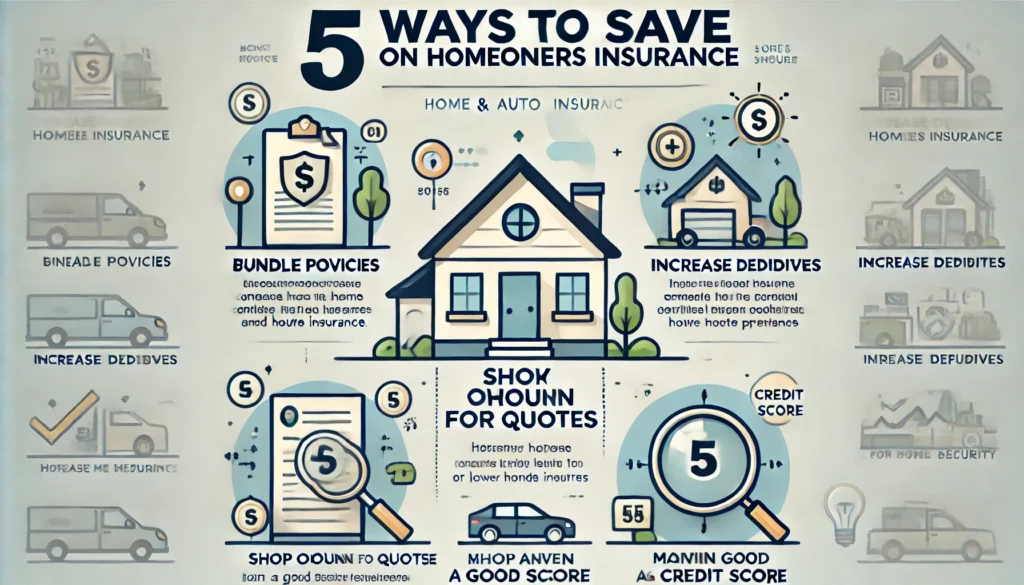5 ways to save on homeowners insurance

Increase Your Deductible
Raising your deductible can significantly lower your premium. Increasing your deductible from $500 to $1,000 could save up to 25% on your homeowners insurance. However, ensure you can afford the higher out-of-pocket expense in case you need to file a claim.
Improve Home Security
Installing security devices can lead to substantial savings:
– Smoke detectors, burglar alarms, and deadbolt locks can save you 2% to 15% on average.
– A comprehensive sprinkler system with monitored fire and burglar alarms could save you up to 20%.
– Some insurers offer discounts for installing water, gas, and fire safety sensors.
Home Insurance Calculator
Bundle Your Policies
Combining your homeowners insurance with other policies, such as auto insurance, can result in significant savings:
– Bundling home and auto insurance can save you 5% to 15% on your homeowners premium.
– Some insurers offer discounts of up to 30% for bundling multiple policies.
Maintain Good Credit
Your credit score can have a substantial impact on your insurance rates:
– In most states, insurers use credit-based insurance scores to determine premiums.
– People with poor credit may pay up to 73% more for homeowners insurance than those with good credit.
– Improve your credit score by making loan payments on time and reducing credit card balances.
Review and Update Your Policy Annually
Regularly reviewing your policy can help you identify potential savings:
– Evaluate the value of your possessions annually to ensure you’re not overinsured.
– Consider removing coverage for items that have depreciated significantly.
– Ask about new discounts you may qualify for, such as being claims-free for several years.
By implementing these strategies, you can potentially save hundreds of dollars on your homeowner’s insurance while maintaining adequate coverage for your home and belongings.
frequently asked questions (FAQs) related to homeowners insurance
- Dwelling coverage (structure of your home)
- Other structures coverage (detached garages, sheds, etc.)
- Personal property coverage (belongings inside your home)
- Loss of use coverage (additional living expenses if your home becomes uninhabitable)
- Personal liability coverage (legal fees and medical bills if someone is injured on your property)
- Medical payments coverage (minor injuries to guests on your property)
- The cost to rebuild your home
- The value of your personal belongings
- Your liability risk
- Additional living expenses you might incur if displaced
- Home features and characteristics (age, structure, wiring, roof type)
- Location (weather risks, crime rates, proximity to fire stations)
- Protective devices (security systems, smoke detectors)
- Claims history
- Personal characteristics (credit score in some states)
- Flood damage (requires separate flood insurance)
- Earthquake damage (requires separate earthquake insurance)
- Landslides or mudflows
- Increasing your deductible
- Installing security devices and safety features
- Bundling policies (e.g., home and auto insurance)
- Maintaining a good credit score
- Reviewing and updating your policy annually
Blake Insurance Group
Phone: (888) 387-3687
Email: [email protected]
Hours: Mon-Fri 9:00 am to 5:00 pm
Sat-Sun: Closed

Blake Nwosu
Owner & Principal Agent
Expertise: All personal and commercial line insurance, including auto, home, business, health, and life insurance.
License: 16117464
